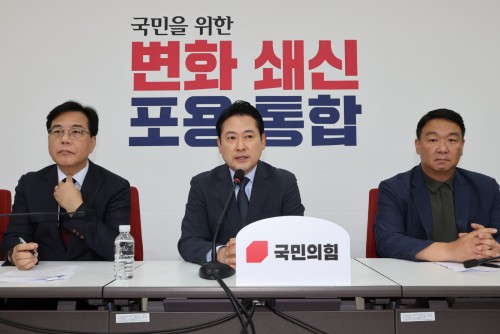 |
| Jang Dong-hyuk, leader of the opposition People Power Party (center), speaks during an emergency meeting at the National Assembly in Yeouido, Seoul, on September 7, calling on President Lee Jae-myung to address the detention of Korean corporate employees by U.S. immigration authorities. / Source: Yonhap News |
President Lee Jae-myung and opposition People Power Party (PPP) leader Jang Dong-hyuk will hold their first one-on-one meeting on Monday, a moment many view as a potential turning point for political stability.
According to political sources on Sunday, Jang plans to raise two top agenda items: the detention of more than 300 Korean workers at a battery plant in Georgia, U.S., and the tariff negotiations that surfaced after the Korea-U.S. summit. He is also expected to press for suspending investigations under the opposition-led “three special prosecutor laws” — covering alleged insurrection, First Lady Kim Keon-hee, and the death of a Marine. The meeting could either open the way for bipartisan cooperation or sharpen the grounds for political confrontation.
The PPP has highlighted that U.S. investment risks for Korean firms have grown after the Georgia detentions, arguing that tariff management was inadequate during the recent summit. The party intends to stress that President Lee must take direct follow-up measures, citing mounting frustration among businesses and the public.
At an emergency meeting on Sunday, Jang said, “Our citizens abroad are chained hand and foot. This is the strongest diplomatic expression of U.S. discontent toward Korea.” He added, “Stronger restrictions on semiconductors followed immediately after we pledged massive U.S. investments. Was this not tied to relations with China or North Korea? Was the sudden search of U.S. military bases the result of President Trump’s strong displeasure? The president must answer directly.”
The PPP is also pushing the special prosecutor issue as a priority, denouncing it as politically motivated. The party argues that the expanded scope and duration of the probes amount to weaponized law enforcement targeting the opposition. Its message to the president will be: “Stop suppressing the opposition and focus on livelihoods.”
Another agenda item is the normalization of the National Assembly. The PPP contends that the Democratic Party’s unilateral handling of committee operations and bill passage has deepened political gridlock. The party is likely to propose creating a regular tripartite consultative body between the president, ruling party, and opposition to institutionalize opposition input.
The PPP also plans to call out the DP’s “one-sided management” of key committees, including the Legislation and Judiciary Committee, which has stalled without an opposition secretary. Major controversial bills such as the Yellow Envelope Act, the third amendment to the Commercial Act, and revisions to the special prosecutor laws have all been passed with DP votes alone.
Analysts say the outcome of the summit will decide whether it becomes a breakthrough for cooperation or a trigger for escalation. If the talks end without results, the PPP is expected to argue that “the president rejected our extended hand” and intensify its struggle, using tools such as filibusters and constitutional appeals. A senior opposition figure warned, “If the DP refuses to shift from partisan battles to real livelihood issues, the regular parliamentary session will inevitably end in a full-scale clash. The meeting’s outcome will determine who gains the upper hand.”
Most Read
-
1
-
2
-
3
-
4
-
5
-
6
-
7





















